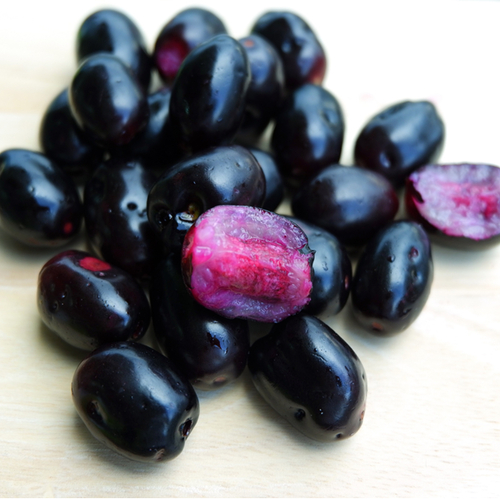
Background
Jambolan is widely used in folk medicine for diabetes.
It is also used by mouth for gas (flatulence), swelling (inflammation) of the stomach (gastritis), constipation, diarrhea, and other conditions.
Jambolan is sometimes used for sore throat, and applied directly to the skin for skin ulcers.
Safety Safety definitions
Special Precautions & Warnings:
Pregnancy and breast-feeding: There isn't enough reliable information to know if jambolan is safe to use when pregnant or breast-feeding. Stay on the safe side and avoid use.Diabetes: Jambolan seed and bark extracts might lower blood sugar levels. Monitor blood sugar levels closely if you have diabetes and take jambolan.
Surgery: Jambolan might lower blood sugar levels. There is some concern that it might interfere with blood sugar control during and after surgery. Stop using jambolan at least 2 weeks before a scheduled surgery.
Effectiveness
Dosing & administration
Interactions with pharmaceuticals
Medications changed by the liver (Cytochrome P450 2C9 (CYP2C9) substrates)
Interaction Rating=Moderate Be cautious with this combination.
Some medications are changed and broken down by the liver. Jambolan might decrease how quickly the liver breaks down some medications. Taking jambolan along with some medications that are broken down by the liver might increase the effects and side effects of some medications. Before taking jambolan, talk to your healthcare provider if you take any medications that are changed by the liver.
Some medications that are changed by the liver include amitriptyline (Elavil), diazepam (Valium), zileuton (Zyflo), celecoxib (Celebrex), diclofenac (Voltaren), fluvastatin (Lescol), glipizide (Glucotrol), ibuprofen (Advil, Motrin), irbesartan (Avapro), losartan (Cozaar), phenytoin (Dilantin), piroxicam (Feldene), tamoxifen (Nolvadex), tolbutamide (Tolinase), torsemide (Demadex), warfarin (Coumadin), and others.
Medications for diabetes (Antidiabetes drugs)
Interaction Rating=Moderate Be cautious with this combination.
Jambolan seed and bark extracts might decrease blood sugar levels. Diabetes medications are also used to lower blood sugar. Taking jambolan seed or bark along with diabetes medications might cause your blood sugar to be too low. Monitor your blood sugar closely. The dose of your diabetes medication might need to be changed.
Some medications used for diabetes include glimepiride (Amaryl), glyburide (DiaBeta, Glynase PresTab, Micronase), insulin, pioglitazone (Actos), rosiglitazone (Avandia), chlorpropamide (Diabinese), glipizide (Glucotrol), tolbutamide (Orinase), and others.
Sitagliptin (Januvia)
Interaction Rating=Minor Be watchful with this combination.
Jambolan seed extract might lower blood levels of the medication sitagliptin. Sitagliptin helps the body lower blood sugar to normal levels in patients with diabetes. Taking jambolan seed along with sitagliptin might cause changes in your blood sugar. Monitor your blood sugar closely. The dose of sitagliptin might need to be changed.


